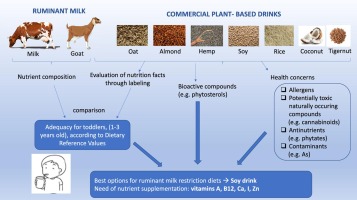
### New Research Uncovers Nutritional Issues in Plant-Based Milk Substitutes
With the increasing interest in sustainable and plant-centric diets, alternatives to cow’s milk—such as oat, almond, soy, and rice beverages—have gained popularity in grocery stores and cafés globally. Although these drinks often promote environmental advantages, a study conducted by the University of Copenhagen has posed significant questions regarding their nutritional quality in relation to conventional cow’s milk.
Published in the journal *Food Research International*, the research explores how the processing techniques of plant-based beverages—especially heat treatments aimed at extending shelf life—modify their nutritional makeup and potentially generate harmful compounds. The results present a crucial insight for consumers: while these beverages may contribute to a sustainable dietary approach, they might not entirely replicate the nutritional benefits provided by cow’s milk.
—
#### The Growth of Plant-Based Milk Substitutes
In the past ten years, sales of plant-based milk have skyrocketed, fueled by changing dietary preferences, ecological concerns, and lactose intolerance. Grocery stores now showcase an array of choices, from almond and soy to newer options such as oat and pea milk. These substitutes are praised for their lower emissions of greenhouse gases, decreased water consumption, and the absence of animal cruelty. Nevertheless, Professor Marianne Nissen Lund, who spearheaded the research at the University of Copenhagen’s Department of Food Science, warns that there are compromises involved.
“We truly need to emphasize plant-based foods. However, if consumers think that plant-based drinks can directly substitute cow’s milk nutritionally, they are mistaken,” Lund remarks.
—
#### The Effect of Heat Processing on Nutrition
One significant distinction between cow’s milk and plant-based drinks lies in their processing. Cow’s milk typically experiences minimal intervention before reaching consumers, while plant-based beverages generally go through multiple processing stages, including heat treatments, to ensure safety and longevity. The study revealed that this processing not only diminishes the nutritional quality of these drinks but may also result in the creation of less favorable chemical components.
Ultra High Temperature (UHT) treatment, commonly applied to plant-based beverages, sterilizes the liquids by exposing them to intense heat for a brief duration. Although effective for preservation, this procedure initiates the Maillard reaction—a chemical interaction between proteins and sugars that deteriorates vital amino acids. A deficiency in these amino acids adversely affects the protein quality in plant-based drinks.
“Plant-based milk substitutes already generally present lower protein content when compared to cow’s milk,” Lund elucidates. “The limited protein they contain can further lose its nutritional value during heat processing, hindering consumers’ intake of essential dietary building blocks.”
—
#### Key Findings from the Research
The research team assessed ten various plant-based drinks available on the market and compared them to cow’s milk. Notable discoveries included:
1. **Reduced Protein Content in Plant-Based Milk**
Plant-based milk alternatives exhibited significantly lower protein levels than cow’s milk, which contains approximately 8 grams of protein per cup. In contrast, unsweetened almond milk frequently has just 1 gram of protein per cup.
2. **Loss of Essential Amino Acids Due to Processing**
The heat treatment necessary for shelf stability not only decreases overall protein levels but also eliminates essential amino acids—nutrients that the body cannot synthesize and must derive from food.
3. **Potential Health Effects**
While cow’s milk is inherently rich in nutrients and provides calcium, vitamin D, and complete proteins, plant-based beverages often need fortification to reach similar nutritional benchmarks. Even with fortification, the absorption efficiency of added nutrients may not be equivalent to that of their natural counterparts.
—
#### Recommendations for Consumers
What does this mean for aficionados of plant-based milk? Professor Lund shares practical guidance for making informed choices.
“Consumers should strive to select the least processed options and consider preparing their own food and drinks when feasible,” she advises. “When choosing plant-based beverages, it’s crucial to ensure you’re obtaining vital nutrients such as protein, calcium, and vitamin D from other dietary sources.”
Lund’s conclusions extend beyond the realm of plant-based milk and emphasize a broader nutritional concept: processed foods, despite their convenience, frequently come with compromises regarding nutrient quality. Whole, minimally processed foods typically offer superior nutrition with fewer artificial additives.
—
#### The Importance of Fortification and Dietary Diversity
To bridge the nutritional divide, many producers enrich plant-based drinks with vitamins, minerals, and extra protein. For instance, some almond or oat beverages are fortified with added calcium and vitamin B12, nutrients that are naturally found in cow’s milk. However, the study also highlights that not all fortified nutrients are effectively absorbed by the body, and the overall nutritional profile may still fall short compared to dairy milk.
For those adhering to vegan or lactose-free diets, incorporating plant-based drinks can contribute to a balanced dietary routine, but it is vital to pay attention to supplementation and food variety. Combining these beverages with a diverse selection of